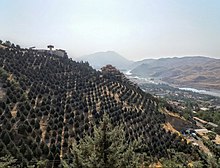City in Tehran, Iran
| Lavasan Persian: لواسان | |
|---|---|
| City | |
 Lavasan Lavasan | |
 | |
| Coordinates: 35°49′15″N 51°38′03″E / 35.82083°N 51.63417°E / 35.82083; 51.63417 | |
| Country | Iran |
| Province | Tehran |
| County | Shemiranat |
| District | Lavasanat |
| Population | |
| • Total | 18,146 |
| Time zone | UTC+3:30 (IRST) |
Lavasan (Persian: لواسان) is a city in, and the capital of, Lavasanat District of Shemiranat County, Tehran province, Iran.
Etymology
The name of Lavasan is a Middle Persian (Pahlavi) word which means "The Mount Blade of Sunrise" or "Mountaintop of Sunrise". It refers to Mount Damavand that is located in the middle Alborz Range in the east of Lavasanat District.
History
| This section does not cite any sources. Please help improve this section by adding citations to reliable sources. Unsourced material may be challenged and removed. (June 2024) (Learn how and when to remove this message) |
In the 19th century, during the Qajar era, Lavasan was reportedly a large village, with some 500 houses and about 200 inhabitants. It became well known during the war of the cities when many people from Tehran took refuge in the nearby towns such as Lavasan.
The two most influential parts of Lavasan are Great Lavasan (Lavasan-e Bozorg) and Little Lavasan (Lavasan-e Kuchak). While Great Lavasan was more vibrant in the early 1950s due to its location as a trade hub, the Little Lavasan has become more populated in the past few decades.
Until the construction of Road 59 (Chalous Road) and other routes to the north of Iran, Great Lavasan was a thriving city on a trade path between Tehran and the north of Iran, with several prominent families owning and managing the Lar Karvansara in the (now nationalized) Lar National Park, and who were active in the trading of rice and production of honey, among other products; hence the name "Great Lavasan".
In the early 1900s Great Lavasan was home to several affluent families and traders with many unique and thriving orchards. Currently Great Lavasan is less populated than the Little Lavasan due to more restricted construction regulations, as well as an influx of new residents moving to Little Lavasan from other cities. Great Lavasan has access from the Jajrood road while Little Lavasan has access from behind the Latian Dam. Their different areas include Saboo Bozorg, Saboo Koochak, Tork Mahale, Seied Paiz, etc.
Under Mohammad Reza Pahlavi, in the 1960s, a hydroelectric dam was built in the southeast of the village which is nowadays one of the water supplies of Tehran.
Demographics
Language and ethnicity
The natives of Lavasan are of Caspian origin. The local dialect, or vernacular, spoken by its natives is a mix of Persian and Caspian.
Population
At the time of the 2006 National Census, the city's population was 15,448 in 4,645 households. The following census in 2011 counted 15,706 people in 5,033 households. The 2016 census measured the population of the city as 18,146 people in 6,130 households.
Geography

Location
Lavasan is located 11 kilometres northeast of Tehran on the slopes of Alborz with an area of 70 square kilometres.
Topography
The Jajrood River flows through the resort city of Lavasan, creating Latian Dam Lake on the southeast of the city. It is situated 11 kilometers northeast of Tehran. The highrise scenery around Lavasan (with many peaks above 3000 meters) attracts lots of campers and cyclists. The city is accessed by two double lane roads (from Tajrish and Tehranpars) adjoining each other on 1930 meters Quchak Pass, then on a whirling double lane road, down to Jajrood River and Lavasan on its north bank on 1700m.
Climate
Lavasan has a cold semi-arid climate (Köppen climate classification: BSk) with significant continental influences.
| Climate data for Lavasan | |||||||||||||
|---|---|---|---|---|---|---|---|---|---|---|---|---|---|
| Month | Jan | Feb | Mar | Apr | May | Jun | Jul | Aug | Sep | Oct | Nov | Dec | Year |
| Mean daily maximum °C (°F) | 4.5 (40.1) |
7.5 (45.5) |
12.5 (54.5) |
19.1 (66.4) |
26.3 (79.3) |
31.5 (88.7) |
34.4 (93.9) |
33.9 (93.0) |
29.5 (85.1) |
22.5 (72.5) |
14.1 (57.4) |
7.8 (46.0) |
20.3 (68.5) |
| Daily mean °C (°F) | −0.8 (30.6) |
2.0 (35.6) |
6.4 (43.5) |
12.3 (54.1) |
18.8 (65.8) |
23.4 (74.1) |
26.2 (79.2) |
25.9 (78.6) |
21.4 (70.5) |
15.3 (59.5) |
8.0 (46.4) |
2.5 (36.5) |
13.5 (56.2) |
| Mean daily minimum °C (°F) | −6.1 (21.0) |
−3.5 (25.7) |
0.4 (32.7) |
5.5 (41.9) |
11.4 (52.5) |
15.3 (59.5) |
18.1 (64.6) |
18.0 (64.4) |
13.3 (55.9) |
8.1 (46.6) |
1.9 (35.4) |
−2.8 (27.0) |
6.6 (43.9) |
| Average precipitation mm (inches) | 30 (1.2) |
27 (1.1) |
32 (1.3) |
28 (1.1) |
18 (0.7) |
4 (0.2) |
2 (0.1) |
1 (0.0) |
1 (0.0) |
8 (0.3) |
15 (0.6) |
21 (0.8) |
187 (7.4) |
| Source: | |||||||||||||
Notable people
Gallery
See also
[REDACTED] Media related to Lavasan at Wikimedia Commons
Notes
- Also romanized as Lavāsān; formerly Galandovak (گلندوك), also romanized as Galandowak and Galandūak
References
- OpenStreetMap contributors (23 September 2024). "Lavasan, Shemiranat County" (Map). OpenStreetMap (in Persian). Retrieved 23 September 2024.
- ^ Census of the Islamic Republic of Iran, 1395 (2016): Tehran Province. amar.org.ir (Report) (in Persian). The Statistical Center of Iran. Archived from the original (Excel) on 12 December 2021. Retrieved 19 December 2022.
- Lavasan can be found at GEOnet Names Server, at this link, by opening the Advanced Search box, entering "217990" in the "Unique Feature Id" form, and clicking on "Search Database".
- Mousavi, Mirhossein (c. 2011) . Creation and formation of three cities, two districts, and three rural districts in Shemiranat County under Tehran province. rc.majlis.ir (Report) (in Persian). Ministry of the Interior, Board of Ministers. Proposal 53.1.2211; Notification 8718/T565. Archived from the original on 9 January 2011. Retrieved 24 December 2023 – via Islamic Parliament Research Center.
- ^ Encyclopaedia Iranica 2017.
- Census of the Islamic Republic of Iran, 1385 (2006): Tehran Province. amar.org.ir (Report) (in Persian). The Statistical Center of Iran. Archived from the original (Excel) on 20 September 2011. Retrieved 25 September 2022.
- Census of the Islamic Republic of Iran, 1390 (2011): Tehran Province. irandataportal.syr.edu (Report) (in Persian). The Statistical Center of Iran. Archived from the original (Excel) on 20 January 2023. Retrieved 19 December 2022 – via Iran Data Portal, Syracuse University.
- Alian, Sahar. "Identifying Curviness of Overpass Mountain Roads from Remote Sensing Data" (PDF).
- "Climate: Lavasan". Climate-Data.org. Retrieved 5 January 2019.
- lavasani genealogical tree presented in Ayatollah Sadeghi in Qum.
Sources
- Encyclopaedia Iranica (2017). LAVĀSĀN.
| Capital | |||||||||||||||||||
|---|---|---|---|---|---|---|---|---|---|---|---|---|---|---|---|---|---|---|---|
| Districts |
| ||||||||||||||||||



